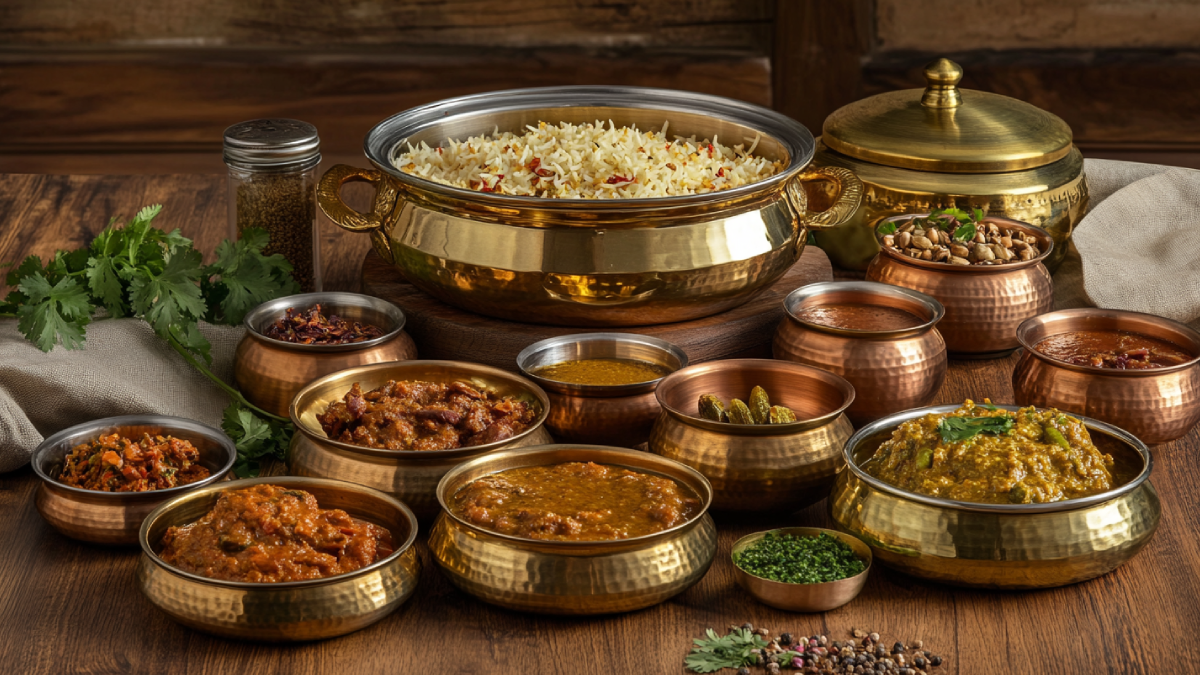Brass utensils have many health benefits and are among the best cookware, considering their durability. If you use brass utensils for cooking, you have made a wise choice.
If you’re still considering whether to use brass utensils, this blog will help you understand why are brass utensils good for health, how to clean brass utensils, and what precautions you should take while using them. Let’s dive in!
Using Brass Utensils for Cooking
Moradabad, Uttar Pradesh, is extremely famous for its brass utensil manufacturing and production. It is even called the “Brass City” of India.
Brass is widely used for cooking, given its high endurance, malleability, and great health benefits. Cooking with brass utensils has been an age-old practice. They have many health benefits, such as increasing immunity.
Moreover, brass is great for cooking since it does not break easily and can withstand for a very long time with proper periodic maintenance. Brass utensils can retain and distribute heat evenly. Similarly, they can retain a certain degree of coolness of the food or drink stored in them.
Are Brass Utensils Good for Health?
Have you ever wondered, ‘Are brass utensils good for health?’ Well, it is well-established that cooking in brass utensils has many health benefits. Here are a few brass utensils’ benefits you should know about:
- Boosts Immunity: Brass is an alloy of copper and zinc. Zinc is an essential mineral that promotes growth and immunity, so using brass utensils for cooking can improve your immunity.
- Benefits Digestion: The alkaline nature of brass can balance stomach acid and overall gut health, thus benefiting digestion.
- Aids in Weight Loss: Copper’s properties are said to promote weight loss. Therefore, using brass utensils can help with weight loss.
- May aid in balancing tri-doshas: Brass or ‘pital’ is considered a neutral metal in Ayurveda that can be used by people with any dosha type. It can aid in balancing the body’s vata, pitta, and kapha.
Precautions For Cooking in Brass Utensils
Cooking with brass utensils has been a traditional practice in many cultures, owing to its benefits. However, there are some important precautions to keep in mind for safe usage:
- Lining with Tin: Brass can react with acidic foods, which releases harmful compounds. To prevent this, brass utensils are often lined with a protective layer of tin to act as a barrier. Keep a check that the tin lining is intact before you use brass utensils. Get them re-tinned if worn out.
- Avoiding Acidic Foods: Even with a tin lining, it’s best to avoid cooking highly acidic foods like tomatoes, vinegar, and tamarind in brass utensils. The acids can cause the brass to leach into the food, leading to a metallic taste and potential health risks.
- Regular Cleaning: Brass utensils should be cleaned regularly to prevent tarnishing. Use a mixture of lemon juice and salt or tamarind. These are effective natural cleaners. Avoid harsh chemicals or abrasive scrubbers, as they can damage the tin lining or the brass.
- Drying Thoroughly: After washing, dry the brass utensils thoroughly to prevent water spots and tarnishing. Brass can develop a greenish patina (verdigris) if exposed to moisture for extended periods, which is toxic and should not be ingested.
- Storing Properly: Always store brass utensils in a dry place, away from moisture. You can also wrap them in a soft cloth to prevent scratches and tarnish.
- Monitoring for Wear and Tear: Regularly inspect brass utensils for signs of wear, such as cracks, dents, or a worn-out tin lining. If you notice any damage, stop using the utensil until it has been properly repaired.
- Heat Distribution: Brass is an excellent conductor of heat, so be mindful of the heat level while cooking. Use medium to low heat to prevent the food from burning or sticking. Handle the utensil carefully to avoid burns.
How to Clean Brass Utensils

Brass utensils can quickly blacken and hold dirt; cleaning them might be a bigger task. Let’s explore how to clean brass utensils.
1. Boiling Water, Tamarind and Vinegar
Add tamarind and vinegar to boiling water. Submerge your utensils in this solution for a while. The period of submerging the utensils may vary depending on how greasy they are. Once the utensils are no longer greasy, wash off the remaining dirt and residue with mild soap and water. Then wipe them dry with a cloth.
2. Vinegar/Lime juice and Salt
Pour some vinegar onto your brass utensils and add some salt over the vinegar. Let it sit for a while, then gently scrub them as you normally do and wipe them with a dry cloth.
3. Vinegar/Lime juice and Flour
Pour some vinegar onto your brass utensils and add some flour over the vinegar. After a while, gently scrub them and wipe them with a dry cloth.
4. Soap and Water
Sometimes, the best method to clean brass utensils is the regular soap and water method. Just scrub your utensils gently with soap and then rinse them with water.
Using brass utensils for cooking can be beneficial if you use it carefully. They are also easy to maintain, making them one of the best utensils for cooking.

